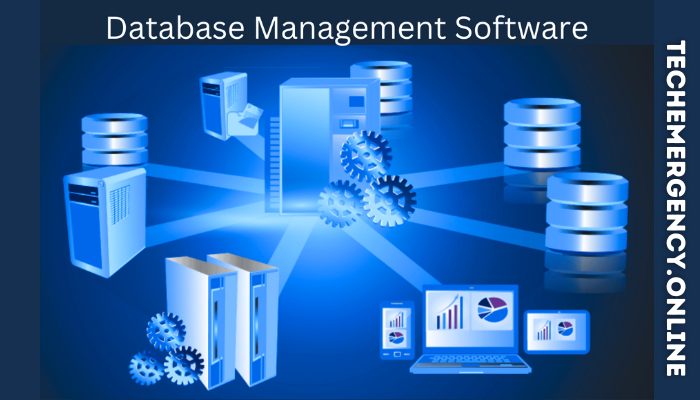Introduction
In the present advanced world, organizations create and depend on huge measures of information. Effective database management software is essential for coordinating, getting, and examining information. A hearty database management software framework (DBMS) assists organizations with smoothing out their tasks, upgrading navigation, and guaranteeing information security. In this article, we’ll investigate the best database management software choices for organizations in 2025, featuring their highlights, advantages, and expected downsides.
- Microsoft SQL Server
Microsoft SQL Server is perhaps of the most comprehensively used social datum set organization systems (RDBMS) in associations, things being what they are. Known for its adaptability and solid execution, SQL Server is perfect for adventures that require critical level data taking care of.
- Specifications:
- Supported Platforms: Windows, Linux
- Licensing: Per core, Server+CAL (Client Access License)
- Data Types Supported: Relational, XML, JSON, Spatial
- Security Features: Transparent Data Encryption (TDE), Always Encrypted, Auditing
- Pros:
- High scalability for enterprise-level businesses
- Advanced security features
- Integration with Microsoft tools and services
- Comprehensive reporting and analytics tools
- Cons:
- Expensive licensing, especially for larger organizations
- Requires skilled IT professionals to manage and optimize
Microsoft SQL Server is great for organizations that as of now use Microsoft items and require superior execution and vigorous security.
- Oracle Database
Oracle is a main data set administration programming known for its venture-level capacities. It gives high accessibility, unwavering quality, and a high level of security, making it a top decision for enormous associations with complex information needs.
- Specifications:
- Supported Platforms: Windows, Linux, Solaris, AIX
- Licensing: Subscription-based, Per Processor, Named User Plus
- Data Types Supported: Relational, XML, JSON, NoSQL
- Security Features: Data Redaction, Advanced Security, Encryption
- Pros:
- Highly scalable for global enterprises
- Strong data security and backup options
- Excellent support for high-performance applications
- Regular updates and new features
- Cons:
- Expensive, particularly for smaller businesses
- Complex setup and maintenance
- Requires expert knowledge for optimal use
Oracle Database is the most appropriate for enormous associations with crucial applications, requiring high accessibility and refined information on the board.

- MySQL
MySQL is an open-source RDBMS comprehensively used by pretty much nothing and medium-sized associations. It’s known for being adroit, fast, and easy to use, offering crucial features for regulating business data without the multifaceted nature of greater structures.
- Specifications:
- Supported Platforms: Windows, Linux, macOS
- Licensing: Open Source (GPL), Commercial
- Data Types Supported: Relational, JSON, Spatial
- Security Features: SSL Encryption, Data Masking
- Pros:
- Free and open-source with active community support
- Simple to set up and use
- Scalable for growing businesses
- Supports a variety of applications
- Cons:
- Limited advanced features compared to other RDBMS
- Can be slower with larger datasets
- Requires manual backups and optimizations
MySQL is ideal for organizations searching for a financial plan well disposed, open-source choice for overseeing moderate to huge data sets.
- PostgreSQL
PostgreSQL is another open-source RDBMS that has acquired ubiquity because of its high level elements and adaptability. A profoundly adaptable data set upholds both social and non-social information types.
- Specifications:
- Supported Platforms: Windows, Linux, macOS
- Licensing: Open Source (PostgreSQL License)
- Data Types Supported: Relational, JSON, XML, Full-Text Search
- Security Features: SSL, Data Encryption, Row-Level Security
- Pros:
- Highly customizable and extensible
- Excellent performance for complex queries
- Active community and wide documentation
- Good support for JSON and NoSQL
- Cons:
- Can be challenging to set up for beginners
- Requires advanced knowledge for optimization
- Performance may degrade with large-scale operations without proper tuning
PostgreSQL is great for organizations that require high adaptability and high level elements for complex information the executive’s assignments.

- MongoDB
MongoDB is a main NoSQL data set known for its adaptability and versatility. It’s particularly appropriate for organizations that arrangement with enormous volumes of unstructured or semi-organized information.
- Specifications:
- Supported Platforms: Windows, Linux, macOS
- Licensing: Open Source (Server Side Public License)
- Data Types Supported: Document-based (JSON-like format), Key-Value, Graph
- Security Features: Authentication, Role-Based Access Control
- Pros:
- Excellent for handling large-scale, unstructured data
- Flexible schema that can handle evolving data types
- Easy horizontal scaling and high availability
- Fast data access
- Cons:
- Not as efficient for transactional workloads
- Less mature than traditional relational databases
- Requires a NoSQL understanding for efficient usage
MongoDB is the most appropriate for organizations with enormous information needs, particularly those managing unstructured information or growing continuous applications.
- IBM Db2
IBM Db2 is a superior presentation, venture grade RDBMS intended for organizations that need to oversee huge datasets safely. Known for its adaptability and incorporation with artificial intelligence and investigation, ideal for associations need both value-based and insightful information abilities.
- Specifications:
- Supported Platforms: Windows, Linux, z/OS
- Licensing: Subscription-based, Per Processor
- Data Types Supported: Relational, XML, JSON, Graph
- Security Features: Advanced Encryption, Identity and Access Management
- Pros:
- Robust analytics and AI integration
- High scalability for large enterprises
- Strong security and compliance features
- Flexible data types supported
- Cons:
- Complex licensing structure
- High cost for small businesses
- Can require significant IT expertise to manage
IBM Db2 is best for undertakings that need progressed highlights for both functional and insightful jobs and require incorporation with simulated intelligence controlled apparatuses.

- MariaDB
MariaDB is a local area driven, open-source RDBMS, made as a fork of MySQL. It’s a well known decision for organizations searching for a free, superior exhibition information base arrangement with further developed highlights and similarity with MySQL.
- Specifications:
- Supported Platforms: Windows, Linux, macOS
- Licensing: Open Source (GPL v2)
- Data Types Supported: Relational, JSON, Geospatial
- Security Features: SSL, Data Masking
- Pros:
- Open-source and free to use
- High compatibility with MySQL
- Advanced indexing and storage engine support
- Active developer community
- Cons:
- Limited enterprise-level support compared to MySQL or Oracle
- May not scale well without proper configuration
MariaDB is great for organizations that need a free, open-source data set arrangement with highlights reasonable for little to medium-sized applications.
- Amazon Aurora
Amazon Aurora is a cloud-based social data set help that is completely viable with MySQL and PostgreSQL. It offers superior execution and versatility, with the capacity to naturally scale as request develops, making it reasonable for organizations working on the cloud.
- Specifications:
- Supported Platforms: AWS Cloud
- Licensing: Pay-as-you-go
- Data Types Supported: Relational, JSON
- Security Features: Encryption at rest and in transit, IAM authentication
- Pros:
- Fully managed cloud service
- Automatic scaling with high availability
- Compatible with MySQL and PostgreSQL
- Integrated with AWS ecosystem
- Cons:
- Pricing can be difficult to predict for large-scale deployments
- Limited to AWS environment
Amazon Aurora is ideal for organizations searching for a completely made due, versatile data set arrangement with cloud-local capacities.
- Couchbase
Couchbase is a NoSQL information base intended for organizations requiring adaptable, elite execution arrangements that can deal with huge volumes of functional and insightful information.
- Specifications:
- Supported Platforms: Windows, Linux, macOS
- Licensing: Open Source (Apache 2.0), Enterprise
- Data Types Supported: Document-based, Key-Value, Full-Text Search
- Security Features: Encryption, Role-Based Access
- Pros:
- High-performance database suitable for large applications
- Strong support for mobile and IoT applications
- Flexible schema and easy scalability
- Cons:
- Steeper learning curve for new users
- Not suitable for traditional transactional data
Couchbase is great for organizations creating portable applications, IoT frameworks, or huge scope applications that require adaptable information models.

- Redis
Redis is a strong in-memory NoSQL data set utilized fundamentally for reserving and continuous information handling. It’s profoundly well known for organizations that require very quick admittance to information.
- Specifications:
- Supported Platforms: Windows, Linux, macOS
- Licensing: Open Source (MIT)
- Data Types Supported: Key-Value, Hashes, Lists, Sets
- Security Features: SSL, Authentication
- Pros:
- Extremely fast read/write operations
- Supports a wide range of data types
- Ideal for caching and real-time analytics
- Cons:
- Limited to in-memory operations, not suitable for persistent storage
- Not a complete solution for large-scale database needs
Redis is ideally suited for organizations requiring quick, continuous information handling, like in storing, proposal motors, or meeting the executives.
Conclusion
Picking the right database management software is basic for your business’ prosperity, and every one of the arrangements recorded above offers special elements. From social to NoSQL and cloud-based data sets, the choices accessible take care of organizations of all sizes and needs. Gauge the determinations, aces, and cons to choose the DBMS that best lines up with your business objectives, spending plan, and IT mastery.




